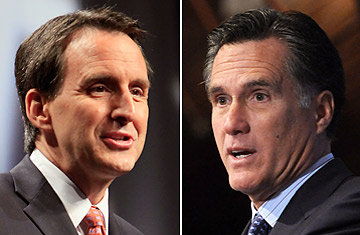
Minnesota Governor Tim Pawlenty, left, and former governor Mitt Romney
(2 of 2)
Bush frequently talks up Daniels' prospects to his associates. And Cheney recently praised Daniels' record and political promise when both men attended one of the Republican Party's most secretive regular gatherings: a dinner called Off the Record, held that particular night in the bunker-like subterranean private dining room of the Wolfgang Puck restaurant the Source in Washington. Some in the room, top GOP strategists among them, said they believed the former Vice President was sending a clear signal about whom his party should support in 2012 when he pointedly said Daniels had more to offer the nation beyond his public service in the Hoosier State. Many of the conservative movement's leading intellectuals and fiscal hawks who worked with Daniels as far back as the Reagan Administration also favor him. But there is substantial doubt that Daniels has the passion, charisma or fundraising mojo to enter the fray.
Other party power players, including many fundraisers, are hoping that Mississippi Governor Haley Barbour, a former Republican National Committee chairman and Beltway superlobbyist, gets into the race. Barbour, who is heading the party's efforts to elect GOP governors in November, has put off serious consideration of a run until after the midterms. But a Barbour candidacy would cause a virtual earthquake, given his prodigious money-raising abilities (one upper-echelon party buckraker believes he could bring in more than $100 million in a few months), his uncommonly amicable relationship with the national press corps and his mastery of many of the political and communications skills necessary for a strong presidential candidate. If things go as planned, look for Barbour (who sources say has been conferring regularly with Daniels) to hold a press conference the day after the midterms to crow about his role in electing a lot of big- and battleground-state governors. At the same time, plenty of Barbour admirers at senior levels of the party fear a serious probe of his days as an influence peddler at a firm that represented corporations and foreign governments and wonder if his family will be willing to commit to the rigors of a national campaign.
Outgoing Minnesota governor Tim Pawlenty was runner-up to Palin in McCain's 2008 veepstakes and will have logged more time in Iowa and New Hampshire than any other would-be candidate by the end of 2010. He is expected to make a decision about a run in early 2011. Smart and personable, he is well liked within the party and has a blue-collar background, a solid record as governor, ties to religious conservatives and an impressive wife ready to support a run. But Pawlenty lacks pizzazz and an obvious ability to raise the tens of millions of dollars necessary to keep up with the front runners.
Newt Gingrich and Mike Huckabee are, like Palin, virtual one-person corporations, with Fox News Channel gigs, book contracts and robust income from paid speeches. Both have clear aspirations and significant strengths. Arguing in favor of a Gingrich run: he's almost 70, making 2012 his last real chance to go for it. Arguing in favor of a Huckabee run: he's the reigning champion of the Iowa caucuses. But both have incentives to stay out, including critical perceived flaws. For Gingrich, this means his bombast, divisiveness and personal history; for Huckabee, his fundraising limitations and controversies from his time as Arkansas's governor.
Former Pennsylvania Senator Rick Santorum, Indiana Congressman Mike Pence, former New Mexico governor Gary Johnson and South Dakota Senator John Thune are all mentioned as prospective candidates, but none are currently positioned to be in the thick of the hunt. Former Florida governor Jeb Bush, son and brother of Presidents, has given many national Republican figures the strong impression that he won't be a candidate in 2012, even if some believe his political and professional credentials might be enough to overcome a double dose of Bush fatigue.
Such a disjointed field can provide only more encouragement for Palin. And nothing would make the White House happier. The President's political advisers, troubled by the weak economy and Obama's image as a big spender, are more worried than he is about re-election and more worried than they let on publicly. Obama has told people that he believes the Tea Party movement will still be going strong in 2012, leaving the GOP to go into battle against an incumbent with a candidate too far right to win. In fact, the President's advisers believe that if Palin is the nominee, New York City's billionaire mayor, Michael Bloomberg, could enter the race as an independent, scrambling all the conventional rules yet again.
The potential first-tier Republican candidates besides Palin — Romney, Barbour, Daniels, Gingrich, Huckabee and Pawlenty — are all more or less Establishment figures who would run traditional campaigns. Three (Barbour, Gingrich and Huckabee) bring a little sizzle to the table but nothing like what Palin packs. In the end, if Palin decides to run and fails, it will be because she couldn't pull it off, not because any of her competitors were uncatchable front runners.
Could the Tea Party movement and fervent anti-Washington feeling sustain themselves for two more years and make 2012 an election in which the grass roots overruns the Establishment and picks both the Republican nominee and the next President? Republican and Democratic elites might scoff at that notion as much as they scoff at Palin's qualifications to be President. But Mark McKinnon, an adviser to George W. Bush and McCain, taps the former Alaska governor as the real front runner in the race, saying, "The conventional wisdom would say that this is Romney's election. But we are in such different times politically that anything could happen." Palin, with her calling from a higher power, millions of locked and loaded hard-core supporters and a slew of mama grizzlies, could prove that in unconventional times, the most unconventional candidate just might have the last laugh.
